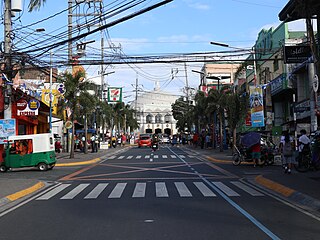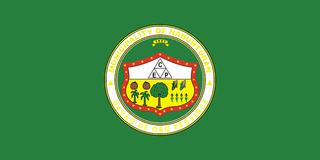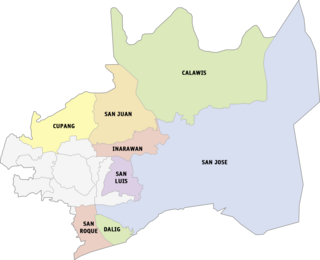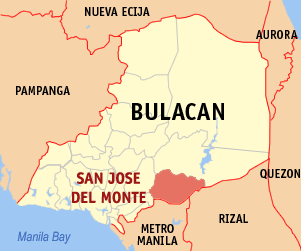Related Research Articles

A city is one of the units of local government in the Philippines. All Philippine cities are chartered cities, whose existence as corporate and administrative entities is governed by their own specific municipal charters in addition to the Local Government Code of 1991, which specifies their administrative structure and powers. As of July 8, 2023, there are 149 cities.

Antipolo, officially the City of Antipolo, is a 1st class component city and capital of the province of Rizal, Philippines. According to the 2020 census, it has a population of 887,399 people. It is the most populous city in Rizal Province and in Calabarzon region, and the seventh most-populous city in the Philippines. It is also the most populated city under the component city status.

Nabunturan, officially the Municipality of Nabunturan, is a 1st class municipality and capital of the province of Davao de Oro, Philippines. According to the 2020 census, it has a population of 84,340 people.

The legislative districts of Rizal are the representations of the province of Rizal in the various national and local legislatures of the Philippines. At present, the province is represented in the House of Representatives of the Philippines by its four congressional districts, with the districts' representatives being elected every three years. Additionally, each district is allotted a certain number of seats in the Rizal Provincial Board, with board members also being elected every three years.
The legislative districts of Antipolo are the representations of the component city of Antipolo in the Congress of the Philippines. The city is currently represented in the lower house of Congress through its first and second congressional districts.
The legislative districts of Apayao are the representations of the province of Apayao in the various national legislatures of the Philippines. The province is currently represented in the lower house of the Congress of the Philippines through its lone congressional district.
The legislative districts of Kalinga are the representations of the province of Kalinga in the various national legislatures of the Philippines. The province is currently represented in the lower house of the Congress of the Philippines through its lone congressional district.

The legislative districts of Cavite are the representations of the province of Cavite in the various national and local legislatures of the Philippines. At present, the province is represented in the House of Representatives of the Philippines by its eight congressional districts, with the districts' representatives being elected every three years. The congressional districts are coextensive with the provincial board districts, where each district is allotted two seats in the Cavite Provincial Board, creating a total of sixteen elective seats in the legislature.
The legislative districts of Davao del Norte are the representation of the province of Davao del Norte in the various national legislatures of the Philippines. The province is currently represented in the lower house of the Congress of the Philippines through its first and second congressional districts.

The legislative districts of Bulacan are the representations of the province of Bulacan in the various national legislatures of the Philippines. The province is currently represented in the lower house of the Congress of the Philippines through its first, second, third, fourth, fifth and sixth congressional districts.

Rizal's 1st congressional district is one of the four congressional districts of the Philippines in the province of Rizal. It has been represented in the House of Representatives of the Philippines since 1916 and earlier in the Philippine Assembly from 1907 to 1916. The district consists of the western Rizal municipalities of Angono, Binangonan, Cainta and Taytay. It is presently the largest legislative district in the country in terms of population. It is currently represented in the 19th Congress by Michael John R. Duavit of the Nationalist People's Coalition (NPC).

Antipolo's 1st congressional district is one of the two congressional districts of the Philippines in the city of Antipolo and one of four in the province of Rizal. It has been represented in the House of Representatives of the Philippines since 2004. The district consists of the western Antipolo barangays of Bagong Nayon, Beverly Hills, De La Paz, Mambugan, Mayamot, Munting Dilao, San Isidro and Santa Cruz. It is currently represented in the 19th Congress by Roberto Puno of the National Unity Party (NUP).

Antipolo's 2nd congressional district is one of the two congressional districts of the Philippines in the city of Antipolo and one of four in the province of Rizal. It has been represented in the House of Representatives of the Philippines since 2004. The district consists of the eastern Antipolo barangays of Calawis, Cupang, Dalig, Inarawan, San Jose, San Juan, San Luis and San Roque. It is currently represented in the 19th Congress by Romeo Acop of the National Unity Party (NUP).

Makati's 2nd congressional district is one of the congressional districts of the Philippines in the cities of Makati and Taguig. It has been represented in the House of Representatives of the Philippines since 1998. It is one of the two districts comprising Makati and, following the Makati–Taguig boundary dispute, as one of the three districts comprising Taguig. The district consists of eastern Makati barangays of Guadalupe Nuevo, Guadalupe Viejo, and Pinagkaisahan, along with the northwestern Taguig barangays of Cembo, Comembo, East Rembo, Pembo, Pitogo, Post Proper Northside, Post Proper Southside, Rizal, South Cembo and West Rembo, collectively known as the Embo barangays that were part of Makati until 2023. It is currently represented in the 19th Congress by Luis Jose Angel Campos Jr. of the Nationalist People's Coalition (NPC).

Valenzuela's 2nd congressional district is one of the two congressional districts of the Philippines in the city of Valenzuela. It has been represented in the House of Representatives of the Philippines since 2001. The district was created following Valenzuela's conversion into a highly-urbanized city through Republic Act No. 8526 on February 14, 1998. It consists of nine barangays in the southern part of the city, namely Bagbaguin, General T. de Leon, Karuhatan, Mapulang Lupa, Marulas, Maysan, Parada, Paso de Blas and Ugong. It is currently represented in the 19th Congress by Eric M. Martinez of the Partido Demokratiko Pilipino (PDP).

Marikina's 1st congressional district is one of the two congressional districts of the Philippines in the city of Marikina. It has been represented in the House of Representatives of the Philippines since 2007. The district was created in 2006 following the passage of Republic Act No. 9364 which amended the 1996 Marikina City Charter. It consists of the southern Marikina barangays of Barangka, Calumpang, Industrial Valley Complex, Jesus de la Peña, Malanday, San Roque, Santa Elena, Santo Niño and Tañong. It is currently represented in the 19th Congress by Maan Teodoro of the United Nationalist Alliance (UNA).

Marikina's 2nd congressional district is one of the two congressional districts of the Philippines in the city of Marikina. It has been represented in the House of Representatives of the Philippines since 2007. The district was created in 2006 following the passage of Republic Act No. 9364 which amended the 1996 Marikina City Charter. It consists of the northern Marikina barangays of Concepcion Uno, Concepcion Dos, Fortune, Marikina Heights, Parang, Nangka and Tumana bordering Antipolo, Cainta, Quezon City, and San Mateo. It is currently represented in the 19th Congress by Stella Quimbo of the Liberal Party (LP).

San Jose del Monte's at-large congressional district is the sole congressional district of the Philippines in the city of San Jose del Monte and one of seven in the province of Bulacan. It has been represented in the House of Representatives since 2004. San Jose del Monte first elected a single representative city-wide at-large for the 13th Congress following the passage of Republic Act No. 9230 in 2003 which amended the 2000 San Jose del Monte City Charter. Before 2004, the city was represented in the nation's lower house as part of Bulacan's 4th, Bulacan's 2nd, Bulacan's at-large and Region III's at-large districts. It is currently represented in the 18th Congress by Florida P. Robes of the Partido Federal ng Pilipinas (PFP) and Arangkada San Joseño (AR).
Zamboanga Sibugay's at-large congressional district was the lone congressional district of the Philippines in the province of Zamboanga Sibugay for the House of Representatives from 2001 to 2007. It was created after the passage of Republic Act No. 8973 in 2000 which partitioned the province of Zamboanga del Sur and established the province of Zamboanga Sibugay. The district was represented by Belma A. Cabilao for the entirety of its existence. She was redistricted to Zamboanga Sibugay's 1st congressional district after the passage of Republic Act No. 9232 which abolished the district and reapportioned Zamboanga Sibugay into two congressional districts following the 2007 census.
References
- ↑ "Roster of Philippine legislators". House of Representatives of the Philippines. Archived from the original on March 16, 2017. Retrieved February 8, 2021.
- 1 2 Republic Act No. 8508 (February 13, 1998), An Act Converting the Municipality of Antipolo Into a Component City to Be Known as the City of Antipolo, Lawyerly, retrieved February 8, 2021
- 1 2 Republic Act No. 9232 (December 22, 2003), An Act Amending Sections 2, 11(a) and 55 of Republic Act Numbered Eighty-five Hundred and Eight, Entitled “an Act Converting the Municipality of Antipolo Into a Component City to Be Known as the City of Antipolo.” and Appropriating Funds Therefor, Official Gazette of the Republic of the Philippines , retrieved February 8, 2021